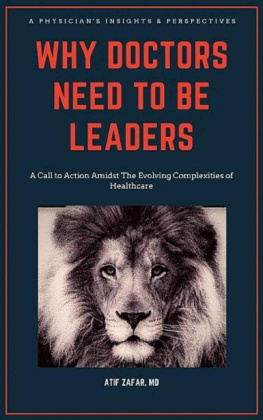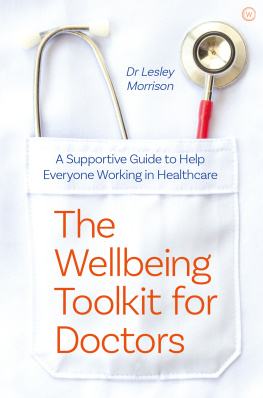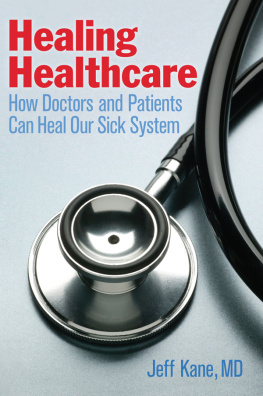Atif Zafar - Why Doctors Need To Be Leaders.: A Call To Action Amidst The Evolving Complexities of Healthcare
Here you can read online Atif Zafar - Why Doctors Need To Be Leaders.: A Call To Action Amidst The Evolving Complexities of Healthcare full text of the book (entire story) in english for free. Download pdf and epub, get meaning, cover and reviews about this ebook. year: 2019, publisher: Atif Zafar, genre: Romance novel. Description of the work, (preface) as well as reviews are available. Best literature library LitArk.com created for fans of good reading and offers a wide selection of genres:
Romance novel
Science fiction
Adventure
Detective
Science
History
Home and family
Prose
Art
Politics
Computer
Non-fiction
Religion
Business
Children
Humor
Choose a favorite category and find really read worthwhile books. Enjoy immersion in the world of imagination, feel the emotions of the characters or learn something new for yourself, make an fascinating discovery.
- Book:Why Doctors Need To Be Leaders.: A Call To Action Amidst The Evolving Complexities of Healthcare
- Author:
- Publisher:Atif Zafar
- Genre:
- Year:2019
- Rating:3 / 5
- Favourites:Add to favourites
- Your mark:
- 60
- 1
- 2
- 3
- 4
- 5
Why Doctors Need To Be Leaders.: A Call To Action Amidst The Evolving Complexities of Healthcare: summary, description and annotation
We offer to read an annotation, description, summary or preface (depends on what the author of the book "Why Doctors Need To Be Leaders.: A Call To Action Amidst The Evolving Complexities of Healthcare" wrote himself). If you haven't found the necessary information about the book — write in the comments, we will try to find it.
Atif Zafar: author's other books
Who wrote Why Doctors Need To Be Leaders.: A Call To Action Amidst The Evolving Complexities of Healthcare? Find out the surname, the name of the author of the book and a list of all author's works by series.
Why Doctors Need To Be Leaders.: A Call To Action Amidst The Evolving Complexities of Healthcare — read online for free the complete book (whole text) full work
Below is the text of the book, divided by pages. System saving the place of the last page read, allows you to conveniently read the book "Why Doctors Need To Be Leaders.: A Call To Action Amidst The Evolving Complexities of Healthcare" online for free, without having to search again every time where you left off. Put a bookmark, and you can go to the page where you finished reading at any time.
Font size:
Interval:
Bookmark:

Atif Zafar is a neurologist, a researcher, an entrepreneur, an advocate, mentor, coach, and a life-long student of science and leadership. In this book, he shares his insights and perspective on physician leadership and why the evolution of physician-mindset in the current healthcare system is crucial. In this book, he wishes to converse with medical students, trainees, early career physicians, and other stake holders to stimulate a transformative discussion and to instigate leadership. These discussions aim to introduce the core principles of leadership for the future generations of doctors, and to foment a culture of leadership in this incisive, analytical, bright and smart faction of the society.
Contributing Authors: Dr. Mudassir Farooqui, M.P.H. and Dr. Syed A. Quadri.
Content Contribution & Improvement: Theresa Simpson.
Proof reading and Editorial expertise by Lyndsay Wilson.
Purpleye Press 2020

Copyright 2019 Atif Zafar. All rights reserved.
To the four smart women who inspire me every day:
My wife, my daughter, my mother, & my sister!
Contents
Financial Expertise
Chapter 1
Introduction
A great number of physicians do not entirely comprehend the business of health care. Several times a week, an average physician cures disease, ameliorates health problems, fixes bones, carries out surgeries, and institutes a range of therapeutic and lifesaving interventions. We consider our jobs to be "saving lives," and we do our best in our everyday medical practice. However, considering present realities, merely saving lives within the confines of the hospital or clinic is not enough. Unfortunately, most physicians are content with their current limited roles in the healthcare system, choosing not to concern themselves with the bigger picture. It's a good thing to feel satisfied with our jobs, but not when the feeling of satisfaction comes at a great cost not just to the physician community but also to the patients we serve. We consciously limit our roles in healthcare to mere day-to-day medical practice which mostly involves pills, surgeries, and therapy. For the better part of our careers, we neglect policies, prices, and interaction with authorities as it relates to healthcare.
As doctors, people entrust us with their health. Many lives depend on our decisions. Consequently the decisions we make, and our willingness to make them, impacts the health and well-being of communities, and frankly the whole nation. We are entrusted with much more than the responsibilities of diagnosis and treatment. While it is easier to merely diagnose and treat disease and let the system take care of the rest, we cannot afford to continue with this ostrich mentality any longer. Our patients look to us to do what is in their best interest, which is increasingly acquiring a new meaning. Our responsibilities toward our patients as well as to ourselves encompass a wide range of activities previously considered out of our scope of work. We owe it to our patients to be proactive in effecting change in ways that will have far-reaching impact on healthcare in general.
Just a few decades ago, smallpox, poliomyelitis, and leprosy ravaged towns, cities, and entire nations, taking the lives of innocent children and breadwinners alike. Fortunately, we now live in a world where those health problems have to a great extent been eliminated thanks to advances in prevention and treatment strategies such as accessible vaccines and cheaper medications. Furthermore, we have made technological advancements like air ambulances that can safely and rapidly transport sick and injured patients hundreds of miles away to well-equipped hospitals.
All of this is possible as a result of gradual progress in healthcare over the course of the last several centuries. While this kind of progress in healthcare continues, physicians are now obligated to begin making progress of a different kind, well beyond the confines of traditional medical practice. As physicians, we are one of, if not the most important players in healthcare. It then increasingly dawns on us to face our most important role in the society - which is providing good health care to populations - with a different perspective.
Since it is reasonably well-established that technological innovations, lower prices, improved healthcare delivery, and patient-focused research can help solve problems within healthcare systems and enhance provision of better medical care to patients, how then can physicians participate in this? How can they help lower drug prices for their patients? How can they help realize affordable healthcare? How can they help catalyze technological innovations in healthcare?
The questions are many, but one common answer lies within physician participation in leadership within healthcare systems. Physicians are uniquely positioned to lead healthcare organizations because they are committed to providing medical care to patients through treatment and prevention of diseases. A study by the London School of Economics found that healthcare institutions with the most physician involvement in management affairs performed considerably better. These institutions were more likely to experience improved effectiveness in general management, performance management, and general leadership as compared with hospitals with little physician leadership.
While there is traditionally a contentious and often conflicted relationship between hospital administrators and clinical practitioners, a leader with a clinical background (a physician leader) gives a healthcare institution credibility and introduces more trust among administrative and medical staff. A clinical background provides physician leaders with skills that allow them to respond to administrative problems in ways that are consistent with present clinical realities. A combination of leadership training with clinical expertise positions physician leaders as powerful and influential leaders capable of instigating relevant changes, seeing new possibilities, breaking down silos, inspiring others, and bringing to life dynamic healthcare visions for organizations.
Its true that some healthcare institutions and medical schools have recently made impressive efforts in providing coherent and relevant leadership training. However, what passes for leadership skills training in most hospitals and medical schools is a jumble of incomplete classes that lack any logical progression, coherence, and relevance. Sadly, the nature and organization of these lectures means they fail to truly develop market-ready, industry-relevant, and effective physician leaders.
Font size:
Interval:
Bookmark:
Similar books «Why Doctors Need To Be Leaders.: A Call To Action Amidst The Evolving Complexities of Healthcare»
Look at similar books to Why Doctors Need To Be Leaders.: A Call To Action Amidst The Evolving Complexities of Healthcare. We have selected literature similar in name and meaning in the hope of providing readers with more options to find new, interesting, not yet read works.
Discussion, reviews of the book Why Doctors Need To Be Leaders.: A Call To Action Amidst The Evolving Complexities of Healthcare and just readers' own opinions. Leave your comments, write what you think about the work, its meaning or the main characters. Specify what exactly you liked and what you didn't like, and why you think so.






